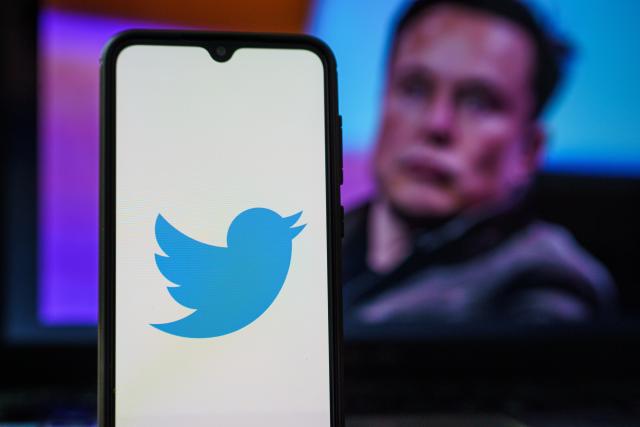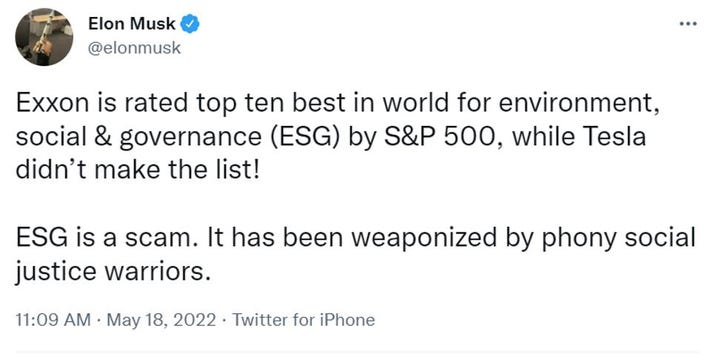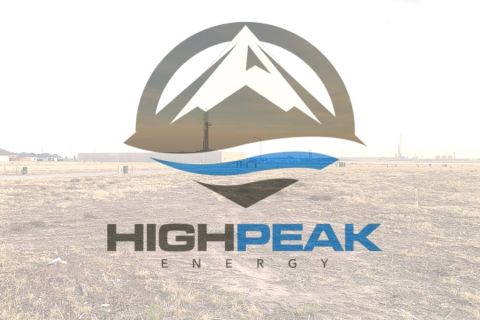
While some are applauding S&P for taking the stand since Tesla has faulted on several E, S and G metrics, others are siding with Musk. (Source: Shutterstock.com)
When Tesla, the world’s leading maker of electric vehicles, was dropped last week from S&P’s ESG Index—which assesses companies’ sustainability efforts and corporate culture—it infuriated CEO Elon Musk, who immediately took to Twitter to call ESG a “scam” that is “weaponized by phony social justice warriors.”
In its defense, S&P clarified that Tesla’s lack of published details related to its “low carbon strategy” or “codes of business conduct” contributed to its departure from the index and even though Tesla’s products help reduce overall carbon emissions, the company has faulted for claims of racial discrimination and poor working conditions.
While some are applauding S&P for taking the stand since Tesla has faulted on several E, S and G metrics, others are siding with Musk, wondering why a billion-dollar company accelerating the world's transition to sustainable energy was de-listed from an index that recognizes sustainability efforts.
“I think it at least odd that the most successful EV company on earth is excluded for not having a somewhat arbitrary carbon reduction target,” David Blackmon, principal at DB Energy Advisors, told Hart Energy.
Additionally, while Apple, Microsoft and Amazon were amongst the highest-ranked companies on S&P’s list, what seemed to amplify Musk’s anger was the fact that oil major Exxon Mobil ranked among the index’s top ten while Tesla scored in the bottom 25%.
“Exxon is rated top ten best in world for environment, social & governance (ESG) by S&P 500, while Tesla didn’t make the list!” Musk claimed in a Tweet last week.
Although Exxon Mobil qualifies for inclusion using S&P’s system of metrics, Blackmon agrees with Musk that those metrics are “difficult to accurately quantify.”
It’s important to note, however, that S&P’s methodology does not take into account overall emissions reductions of businesses. Instead, S&P rates environmental performance of companies based on how they perform relative to peers like their net zero commitment and disclosure of climate-related risks—two critical areas of ESG in which Tesla performs poorly.
Exxon, on the other hand, is increasingly investing in reducing its emissions and has a climate plan that aligns with the goals of the Paris Agreement.

“To me—and I think the argument Musk was really making—the real question here is why should corporations be punished in the marketplace for not spending those millions to conform themselves to these [ESG] metrics?” Blackmon questioned.
He went on to compare ESG practices to the recent practice of public schools spending most of their class time teaching to a standardized test rather than focusing on real learning and rewarding students for excellence.
“Musk feels his company is basically already an honor student in this realm and obviously believes taking the standardized test is a waste of time and money,” Blackmon said, adding, “I certainly think he has a valid argument in that regard.”
Not everyone supports Blackmon’s view.
“Is ESG an “outrageous scam”? Short answer is no, ESG is not a scam,” Christine Uri, Chief Legal Officer and Chief Sustainability Offer at management consulting company ENGIE Insight Services, said in a LinkedIn post.
“ESG measurements are not about social impact. ESG measures whether the company is operating in an environmentally and socially responsible manner—and S&P’s index specifically seeks to apply this measurement across industries,” Uri added.
“A company can have an amazing and inspiring mission and still not use the highest environmental and social practices in how it operates," she noted.
ESG Ratings
Already controversial for its lack of universal measurement, the incident has brought back spotlight on ESG metrics, with many calling for the need to convert ESG metrics to dollar values for accurate measurement and comparison.
“Until the ESG industry is able to convert ESG metrics into dollar values, ESG ratings will be defined by subjectivity and lack of transparency, and will continue to be the ugly stepchild vis-à-vis traditional financial credit ratings,” said Malcolm Harris, U.S. head at ESG software company Novisto.
“We are essentially operating under an “ESG barter system,” he added, “with no way of comparing metrics across E, S and G, with the possible exception of carbon pricing.”
Harris also noted that the controversy shouldn’t “cause us to lose sight” of the more fundamental issues in ESG such as measuring ESG metrics correctly.
Although ESG measurement is an increasingly popular way of holding companies accountable when it comes to sustainability efforts, measurement, no matter how sophisticated, is easier at capturing easily quantifiable inputs such as carbon emissions compared but complex to measure impacts such as board diversity, he noted.
But most companies are not actually measuring much of anything, Harris said.
“Companies use emissions factors instead of direct measurements without a clue of how to measure biodiversity and are managing their ESG data in a fashion that is completely unacceptable from the perspective of accountants and auditors,” he added.
Recommended Reading
Par Pacific Asset-based Revolving Credit Bumped Up by 55%
2024-03-25 - The amendment increases Par Pacific Holdings’ existing asset-based revolving credit facility to $1.4 billion from $900 million.
HighPeak Energy Authorizes First Share Buyback Since Founding
2024-02-06 - Along with a $75 million share repurchase program, Midland Basin operator HighPeak Energy’s board also increased its quarterly dividend.
PHX Minerals’ Borrowing Base Reaffirmed
2024-04-19 - PHX Minerals said the company’s credit facility was extended through Sept. 1, 2028.
CorEnergy Infrastructure to Reorganize in Pre-packaged Bankruptcy
2024-02-26 - CorEnergy, coming off a January sale of its MoGas and Omega pipeline and gathering systems, filed for bankruptcy protect after reaching an agreement with most of its debtors.
Baytex Prices Upsized Private Placement of Senior Notes
2024-03-15 - Baytex intends to use the proceeds to pay a portion of outstanding debt on its credit facilities and general corporate purposes.





